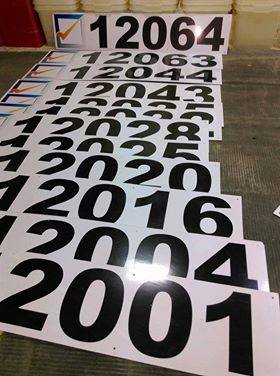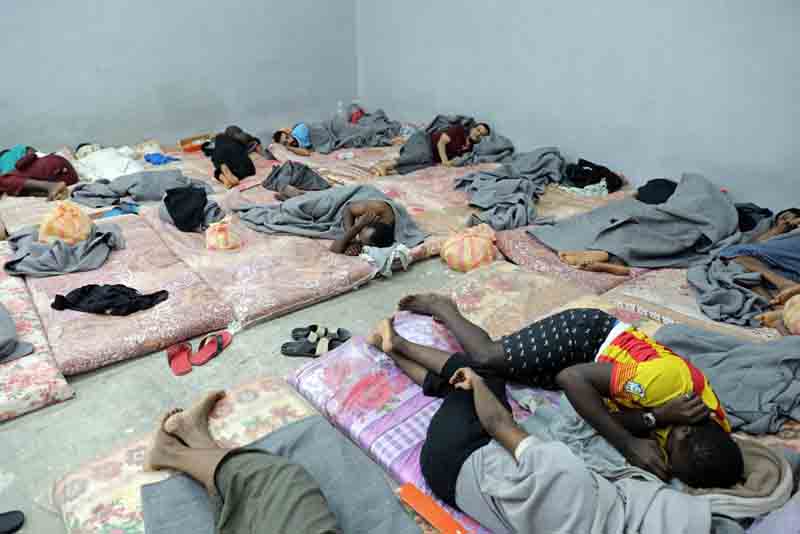By Sami Zaptia.

London, 14 November 2017:
Libya’s High National Elections Commission (HNEC) announced yesterday that it has accredited a number of new polling centres across Libya. The announcement comes on the back of meetings between HNEC and both of Libya’s contending political parties in Tripoli and Tobruk.
HNEC reported that as part of its preparations for the upcoming elections, it has sent shipments of numbered signs of election centres (polling stations) to: Tripoli, Misrata, Zliten, Bani Walid, Aziziyah, Nawahi Arbaa, Benghazi, and Jabal 2.
Numbered signs are also expected to arrive in the remaining offices within the next two days. These numbered signs are for newly prepared and for existing election centres with damaged signs.
HNEC said that it had also accredited an additional number of educational schools as electoral centres, which numbered 219. Among them are centres for persons with disabilities, a step that is part of the HNEC’s expansion strategy as means of access to voters in various regions and cities of Libya, and to reduce congestion within centres with a high population density.
The HNEC announcement comes on the back of a meeting yesterday between HNEC head Imad Sayah and House of Representatives (HoR) president Ageela Saleh in Tobruk. At the meeting the readiness and needs of HNEC to organize elections were discussed.
The HoR Media Office said the requirements by HNEC for legal reform by the HoR for elections or a referendum were also discussed. The Media Office quoted Sayah saying that HNEC would be ready ‘‘upon a signal from the HoR’’ to launch an election.
The Media Office also reported that the discussion between Saleh and a number of other HoR members at the meeting would be reported to the HoR at it session today.
HNEC head Sayah was quoted as saying that his organization needed some time and support to prepare for elections ‘‘in the future’’ without giving any clues to a precise timeline.
He said that ‘‘preparation was important…so as to achieve an uncontested election result’’. He stressed that ‘‘political agreement was necessary’’ and that Libya’s ‘‘next election was very important as Libya’s future depended on it’’.
It will be recalled that HNEC head Sayah had also met with Presidency Council/Government of National Accord (PC/GNA) Prime Minister-designate Faiez Serraj on 6 November to discuss HNEC’s preparations for the forthcoming elections.
During that meeting, Serraj had stressed the willingness of his PC to support HNEC in carrying out its tasks, and assured of the PC’s readiness to provide the required support and in finding solutions to the constraints faced by HNEC in preparation for any future elections.
For his part, Imad al-Sayih had explained that a number of technical details needed to be completed to ensure that HNEC would be fully prepared to perform its tasks efficiently and professionally ‘‘once the political parties had agreed to hold elections’’.
It will be recalled that Serraj had called in July this year for elections
https://www.libyaherald.com/2017/07/17/mixed-reaction-to-serrajs-elections-call/
be held n March 2018 as a solution to the political impasse between the contending Libyan political parties.
The subtle pressure by Serraj on HNEC to make it publicly prepare for elections is seen by some as pressure on the dialogue committee
https://www.libyaherald.com/2017/10/17/hor-suspend-tunis-dialogue-talks-accuses-state-council-of-reneging-on-deal-agreed-so-far/
which failed to reach a solution during its two rounds of meetings in Tunis. It is also seen as pressure on the HoR which some critics have accused of dragging its feet in the dialogue committee talks.
UNSMIL head Ghassan Salame has also proposed his Action Plan which was approved by the Security Council this October which involves elections as the legitimizing solution to Libya’s ongoing political stalemate.
https://www.libyaherald.com/2017/10/11/un-security-council-backs-salames-action-plan/










